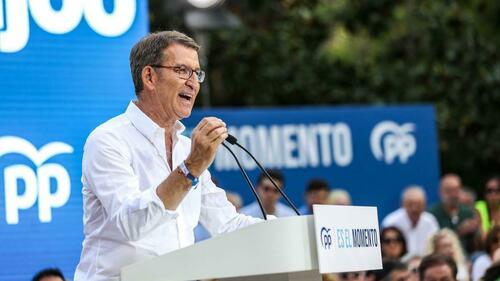Spanish Election Fails To Deliver Decisive Rejection Of Socialist PM
Spain’s national election ended in a close finish on Sunday that fell short of a right-wing takeover and prompted predictions of a hung parliament and the need to conduct another election.
It takes 176 seats to control the Spanish parliament and form a government. With all votes tallied, Reuters reports that the ruling Socialist party won 122 seats, while the center-right People’s Party has 136.
Forming a new government will require the building of a coalition. That puts the spotlight on the next two-strongest finishers: the far-left Sumar party and far-right, anti-immigration Vox party, which won 31 and 33 seats, respectively. Even if one assumes they team up with the major parties on their side of the spectrum, that only adds up to 153 seats on the left and 167 on the right.
Leading up to the election, the People’s Party was widely expected to win an outright majority and oust incumbent Socialist Prime Minister Pedro Sanchez. Meanwhile, Vox saw a drop in support — from 52 seats in 2019 to 33 — that seems to have doomed the prospect of a conservative-coalition government led by Alberto Núñez Feijóo.
An election that was anticipated to deliver a right-wing sea-change victory has instead left Spain’s political future uncertain.

After the results were tallied, Feijóo said Spain has always been governed by the top vote-getter and argued that Spain’s next government should be formed “in accordance with the electoral victory.”
Global consulting firm Teneo, however, feels the socialist Sanchez is in the better position to form a coalition. However, the firm only gives him a 45% chance of cobbling a coaltion with Sumar and lesser parties, such as the Catalan Republican Left, which favors independence of the prosperous region of Spain and won 7 seats on Sunday.
Sanchez’s tenure has spanned five years. After his party suffered devastating defeats in May local elections — fueled in part by discontent with price inflation — he called Sunday’s snap election. The timing — coming in the midst of travel season and a heat wave — wasn’t popular.

The Socialists have also invited anger with botched criminal justice reform legislation that led to the release of more than 100 sexual offenders and sentence reductions for nearly a thousand more.
The drive to form a ruling coalition won’t begin until the newly-constituted parliament reconvenes on August 17. In the ensuing days, King Felipe VI will host party leaders to discuss the prospects for the formation of a government.
The king will then select a candidate for prime minister, who will then have several weeks to build a ruling coalition. Given the high stakes of that meeting with the king, Sanchez and Feijoo will both be scrambling to garner support and bring a compelling case to Zarzuela Palace.
Tyler Durden
Mon, 07/24/2023 – 06:55
via ZeroHedge News https://ift.tt/mR8p2gq Tyler Durden